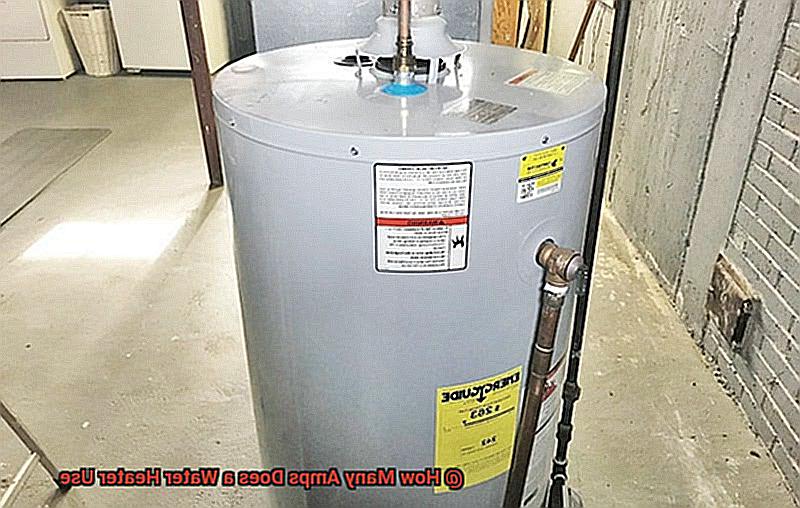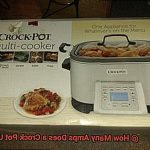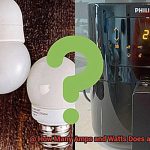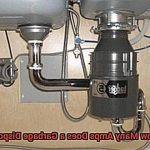Are you tired of constantly worrying about high electricity bills? Have you ever wondered how many amps your water heater uses? Brace yourself, because your water heater is one of the most power-hungry devices in your home. The more you use it, the higher your utility bill will be. However, don’t lose hope just yet. Knowing how many amps your water heater uses can help you manage your consumption and reduce those pesky energy costs.
When it comes to determining how many amps a water heater uses, size matters. A larger unit will consume more power and require more amps to operate. But that’s not all – the age of the unit, its energy efficiency rating, and even the temperature settings also play a role in determining the amps used.
Now, I know what you’re thinking – “What even is an amp?” Well, my friend, an amp is simply a unit of electric current. It measures the rate at which electricity flows through a circuit. Different water heaters consume different amounts of amps, ranging from 15 amps to 40 amps based on their size and power rating.
In this blog post, we’ll dive deeper into the topic of how many amps does a water heater use and explore ways to manage your consumption to reduce those dreaded monthly electricity bills. So if you’re ready to start saving some money (who isn’t?), let’s get started.
Understanding the Basics of Amps and Water Heaters
Contents
Amp is the unit used to measure electric current, and it determines the flow of electrons in a circuit. When it comes to water heaters, the amount of amps required depends on several factors such as the size and type of heater, the voltage supply, and the heating element’s wattage.
In other words, a typical residential electric water heater uses between 15-20 amps, while a gas water heater uses less than 1 amp.
However, larger commercial water heaters may require up to 50 amps or more.
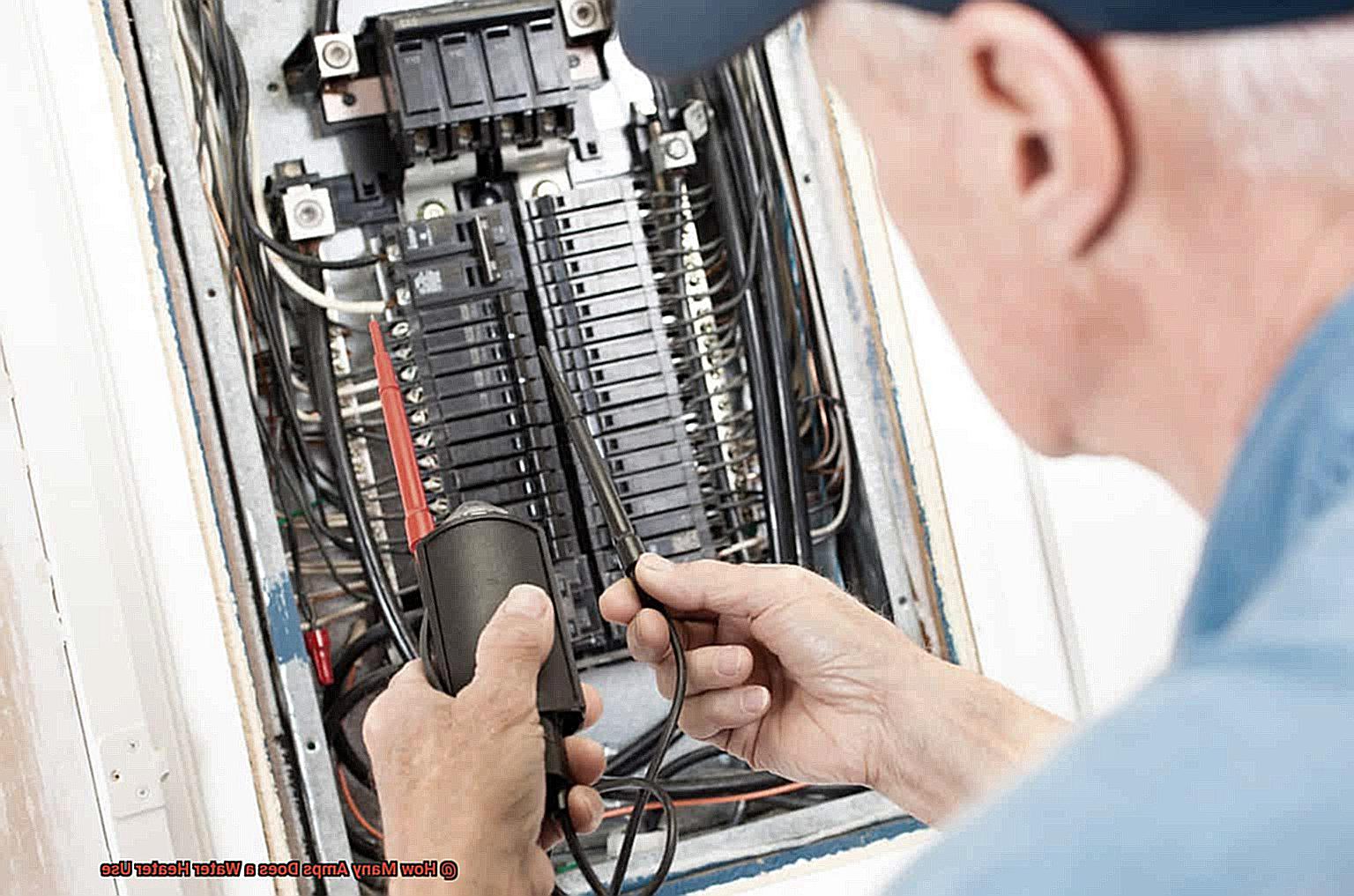
It’s crucial to note that exceeding the maximum amp limit can lead to tripped breakers, electrical fires, or damage to the water heater. Therefore, it’s essential to ensure that the wiring and electrical components are compatible with the water heater’s amp requirements before installation.
Knowing how many amps your water heater uses helps you estimate your monthly energy bills accurately. You can use an energy calculator or consult with an electrician to determine the actual energy usage of your water heater. This information is also useful when purchasing a new water heater as it helps you make an informed decision about the right size and type of heater that meets your needs.
Think of understanding amps like knowing how much gas your car needs to run efficiently. Just like using too much or too little gas affects your car’s performance, exceeding or underutilizing amps can affect your water heater’s efficiency and lifespan.
Understanding the basics of amps and their relation to water heaters is crucial for optimal performance and safety. It helps homeowners make informed decisions when purchasing and installing a new water heater and troubleshoot any electrical issues that may arise during operation.
How Many Amps Does a Residential Electric Water Heater Use?
Whether you’re looking to optimize performance, ensure safety, or obtain accurate monthly energy bill estimates, understanding the amount of amps your water heater consumes is essential. In this post, I’ll provide you with all the information you need to know about how many amps a typical residential electric water heater uses and what factors may impact its electricity consumption.
Residential electric water heaters are a cornerstone appliance in most households, providing hot water for daily activities such as bathing, washing dishes, and doing laundry. These water heaters operate by using electricity to heat up the water in their tanks, with their electricity consumption measured in amps.
The number of amps a residential electric water heater uses depends on its wattage and voltage rating. Typically, a 40-gallon electric water heater will use between 20 and 30 amps, while a 50-gallon model will use between 25 and 35 amps. However, these numbers can vary depending on the specific make and model of the water heater.
It’s important to note that the amount of electricity a water heater uses depends on how often it’s used and how much hot water is needed. If you have multiple occupants in your household who take daily showers, then your hot water usage will be higher than if you have only one person who takes occasional baths.
To determine how many amps your residential electric water heater is using, you can consult the owner’s manual or contact the manufacturer. Alternatively, you can use an amp meter to measure the current draw of the water heater when it’s operating.
It’s worth noting that electric water heaters consume a significant amount of energy, which can result in higher energy bills.
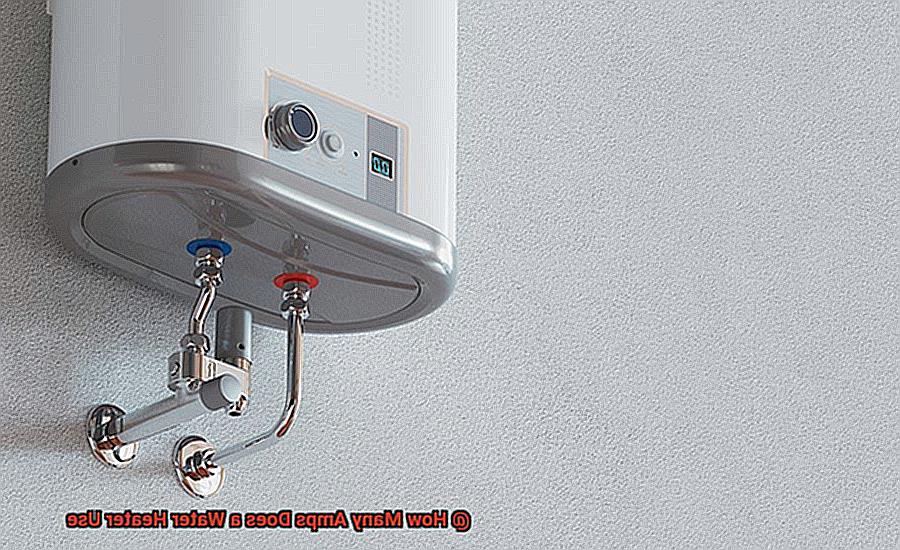
To save energy and reduce costs, homeowners can consider upgrading to a more energy-efficient model or installing a timer to control when the water heater operates.
Additionally, reducing hot water usage through shorter showers or using cold water for washing clothes can also help to lower energy consumption.
How Many Amps Does a Gas Water Heater Use?
Typically, a gas water heater uses around 3-5 amps, making it an energy-efficient and cost-effective option for your home.
One of the benefits of a gas water heater is that it doesn’t use as much electricity as an electric water heater. Instead of relying on heating elements, gas water heaters use a gas flame to heat the water. This means that they require less electricity to operate. However, they still need some electricity to power the thermostat, gas valve, and igniter.
But don’t worry – the amount of electricity used by these components is minimal compared to an electric water heater. So, you can enjoy hot showers without worrying about your energy bill skyrocketing.
It’s essential to keep in mind that a power outage can affect your gas water heater’s functionality. The electrical components won’t be able to turn on and ignite the gas flame, leading to no hot water. Therefore, it’s crucial to have a backup plan in case of a power outage, such as having a generator or another source of electricity available.
A gas water heater is an excellent choice for those who want an energy-efficient and reliable option for their home. It uses minimal amps during normal operation, allowing you to enjoy hot showers without breaking the bank.
What Is the Wattage of an Electric Water Heater?
Let me shed some light on the subject. The wattage of an electric water heater is a crucial factor to consider when determining its energy usage. This rating can vary from 1,000 to 5,500 watts or more, depending on the size and type of the heater.
Now, here’s where things get interesting. The wattage rating is an indicator of how much electrical power a water heater consumes while in operation. Simply put, the higher the wattage rating, the more electricity it will consume. Think of it like a bottomless pit – the more you feed it, the more it will want. For instance, a 4,500-watt water heater will consume more electricity than a 3,000-watt water heater.
It’s important to note that wattage rating is not the same as amperage rating. The amperage rating measures the amount of electrical current that flows through the water heater. To calculate the amperage rating, divide the wattage by the voltage. For example, if a 3,000-watt water heater operates at 240 volts, it will draw approximately 12.5 amps of current (3,000 watts ÷ 240 volts = 12.5 amps).
Understanding the wattage rating of an electric water heater is essential in determining its energy consumption. It also helps you choose a water heater that fits your energy needs without breaking the bank. So, when shopping for an electric water heater, make sure to pay attention to its wattage rating and calculate its amperage rating to make an informed decision.
Calculating Energy Usage for Your Water Heater
The culprit may be your water heater. Believe it or not, this appliance could be consuming more electricity than you realize. But fret not, calculating its energy usage is simpler than you think.
To begin, you’ll need to know the wattage of your water heater. Typically, most electric water heaters have a wattage between 4500-5500 watts, while gas water heaters range between 30,000-50,000 BTUs. Once you know your water heater’s wattage, use this formula to calculate its amperage: amps = watts/volts.
For instance, if your electric water heater has a wattage of 4500 and operates on a standard 240-volt circuit, then it would consume approximately 18.75 amps (4500/240=18.75). Next, multiply the amps by the number of hours your water heater is used each day to calculate its daily energy usage. For example, if your water heater consumes 18.75 amps and is used for three hours per day, then it would consume 56.25 amp-hours per day (18.75 x 3 = 56.25).
Now that you’ve calculated your water heater’s energy usage, you can take steps to reduce it and save money on your electric bill. One way is to install a timer or smart thermostat to control when your water heater operates. This way, it only runs when needed and doesn’t waste electricity when no one is home.
Another technique to reduce energy consumption is to insulate the tank and pipes of your water heater to prevent heat loss. This ensures that the water in the tank stays hot for longer periods, and the heater doesn’t have to work as hard to maintain the temperature.
Lastly, if your water heater is old or inefficient, consider replacing it with a newer, more energy-efficient model. Not only will you save money on your electric bill, but you’ll also be helping the environment by reducing your carbon footprint.
Calculating the energy usage of your water heater is an essential step in managing your home’s electricity consumption. By following simple formulas and adopting energy-saving practices, you can save money on your electric bill and contribute to environmental conservation efforts.
bD0KLBOM2tw” >
Conclusion
In conclusion, knowing how many amps your water heater uses is vital for managing your energy consumption and keeping your electricity bills in check. The size, age, and energy efficiency rating of the unit all play a role in determining its amp usage. Amps are simply a unit of electric current that measures the rate at which electricity flows through a circuit.
Residential electric water heaters typically use between 15-20 amps, while gas water heaters use less than 1 amp. However, larger commercial water heaters may require up to 50 amps or more. By understanding how many amps your water heater uses, you can accurately estimate your monthly energy bills and make informed decisions when purchasing and installing new units.
It’s crucial to note that exceeding the maximum amp limit can lead to tripped breakers, electrical fires, or damage to the water heater. Therefore, it’s essential to ensure that the wiring and electrical components are compatible with the water heater’s amp requirements before installation.
To save money on your electric bill and reduce energy consumption, homeowners can consider upgrading to more energy-efficient models or installing timers or smart thermostats to control when their water heaters operate.
Additionally, insulating the tank and pipes of a water heater can prevent heat loss and reduce its workload.
